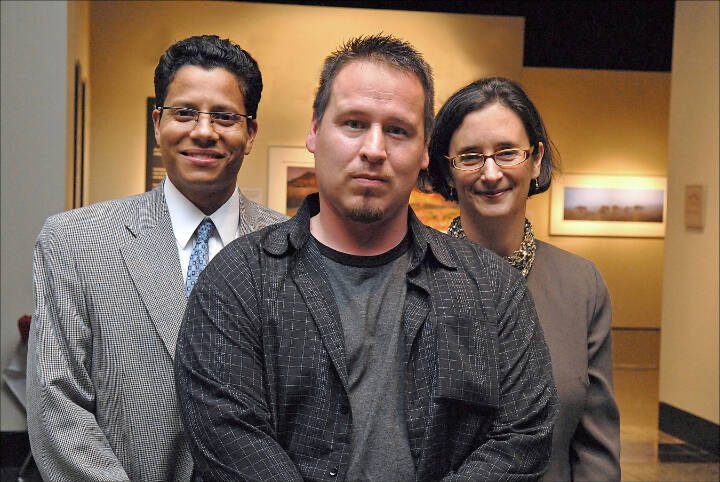By Jacquelyn Jimenez Romero / The Seattle Times
OLYMPIA — Victims of false confessions that lead to wrongful convictions, like Ted Bradford, want to prohibit police from using deceptive tactics during interrogations, and they have the backing of some lawmakers.
“It was the worst experience of my life,” said Bradford, Washington’s first DNA exoneree, when recalling his 1996 interrogation when he was accused of sexual assault. “I knew I was innocent … no matter how many times I told them over and over, I didn’t do this.”
House Bill 1062, sponsored by Rep. Strom Peterson, D-Edmonds, aims to make defendants’ statements inadmissible in court if police use deceptive tactics during interrogations to get those statements. Nine states have passed similar laws, but they only apply to juveniles. The bill has received two hearings in the House this legislative session.
Advocates say this legislation, aside from keeping innocent people out of prison, is also about building trust between the public and law enforcement. Some in law enforcement argue that deception is not coercion and taking away this tactic decreases their effectiveness in convicting people and solving cases.
“I think there’s this space in the middle that often gets looked over, post-arrest, pre-conviction,” Peterson said. “There are a lot of things that happen there that I don’t think we’ve paid enough attention to.”
The majority of interrogations happen in the back of a patrol car or on the side of the road, according to Derick Sanders, Thurston County sheriff. He argues police tactics are always under the microscope.
James McMahan, policy director of the Washington Association of Sheriffs and Police Chiefs, argued in public testimony Jan. 8 that deception is required to get to the truth. An example, he said, would be not telling a suspect in cases involving the exploitation of children the true age and identity of an undercover trooper who was posing as a minor.
“Sometimes, it’s an unfortunate reality, we have to lie to people to get them to tell the truth,” McMahan said. “If we could somehow get people to actually be required to tell the truth, we wouldn’t have to lie. That’s just an unfortunate reality of law enforcement.”
However, current police interrogations encourage bias and leave people vulnerable to the power imbalances between law enforcement and citizens, said Dave Thompson, president of Wicklander-Zulawski & Associates, a firm that provides interrogation training to law enforcement.
How a false confession is generated
In 1996, Bradford, 22 at the time, was asked to come to the Yakima Police Department to help with a case. He said he was asked to waive his rights and when he asked police whether he needed an attorney they said no because they were only asking a few questions. He signed the waiver thinking he was going to help, but a few questions turned into a nearly nine-hour interrogation, with no food and a small cup of water, he said.
Identifying the wrong person begins with faulty evidence, and often police make people fit the evidence rather than the other way around, says James Trainum, a former detective with the Washington, D.C., Police Department who now does law enforcement consulting.
“Rather than develop your case, develop your suspect, develop your evidence, you’re taught that you can use this to bypass all of that, and just quickly identify a suspect, and then move on,” Trainum said.
In Washington state, 23% of exonerations involve false confessions, according to data from the Washington Innocence Project. However, this number could be higher because there’s not enough data to know the actual number of wrongful convictions in the state, according to Lara Zarowsky, executive director of the Washington Innocence Project.
In the 1969 case Frazier v. Cupp, the U.S. Supreme Court ruled in favor of police using deception tactics during interrogations. The Reid technique, the most common technique used by police, includes using guilt-presumptive questions during interrogations. By lying to people about false evidence, Trainum says police hope to persuade a confession.
“Just because the courts find it permissible doesn’t mean that they’re not problematic,” said Trainum, who said he garnered a false confession in a 1994 high-profile kidnapping and murder case using the Reid technique.
Bradford’s battle to prove his innocence to police left him feeling threatened and intimidated after aggressive questioning and accusations. At the end of the day, he couldn’t handle it anymore and signed a confession.
Interrogations can differ depending on the situation, according to Sanders, the Thurston County sheriff.
“The type of crime, the temperament of the officer, the temperament of the suspect, those are all things that play a pretty big factor into how people are interrogated,” he said.
Sanders says not every case requires a ruse, but when they do, they’re used when police need people to think they know more than they do to close an investigation.
According to Sanders, there are already procedures in place that can dispute false confessions in what are called criminal rule 3.5 hearings, where defendants can have evidence dismissed if they assert police lied inappropriately or violated case law. He believes fewer wrongful convictions will exist as technology improves.
However, because of Frazier v. Cupp, decisions from criminal rule 3.5 hearings make their way to court anyway, said John Marlow, litigation director of the Washington Innocence Project. The court decides whether the confession is allowed as evidence and the jury ultimately decides whether it’s believable, Marlow said.
“The criminal legal system in practice does not operate in the way that we think it does when you just read the rules on paper,” Zarowsky said.
Why confess to a crime you didn’t commit?
In 2007, Amanda Knox was a 20-year-old college student at the University of Washington. She garnered worldwide attention after being wrongfully convicted of murdering her roommate Meredith Kercher in Italy during a study abroad trip. During her interrogation, Knox, who testified in support of HB 1062, recalls police making her feel like she was going insane.
“The extent to which I was unprepared for people who I trusted to lie to me was what led me as an innocent person to be particularly vulnerable and which is what led to my eventual wrongful conviction,” Knox said in an interview.
The more successful a strategy is in eliciting confessions from guilty suspects, the more likely it is that this strategy will also produce false confessions from innocent suspects, according to a 2004 research paper published by the Encyclopedia of Applied Psychology.
Juveniles and people with intellectual disabilities are more susceptible to deception, the research showed. But under the right circumstances, this can happen to anyone, Zarowsky said.
Bradford recalls police making threats and lying to him about DNA evidence they said proved he committed the crime. After hours of interrogation, he confessed, hoping the evidence would acquit him.
“I started thinking to myself, the only way out of this is if I just give them a statement,” Bradford said. “Then they can test their evidence and they’ll find out that I’m innocent. I’ll be done. I’ll be free of all of this.”
Experts call this a coerced-complaint confession.
For Knox, during her 53-hour interrogation in Italy, she rarely had a translator and became tired and confused. Police accused her of having amnesia and she recalls an officer hitting her in the head and telling her to remember. By attempting to make sense of the situation, she ended up creating a false memory and signed what’s called a coerced-internalized confession.
“I was put in a position where I was made to feel insane because the police lied to me,” Knox said. “They told me that I had amnesia and that I didn’t remember what the truth was.”
What alternatives exist?
Prosecutors sometimes are reluctant to believe someone’s innocence even after DNA acquits someone, wrote Saul Kassin, a professor of psychology at The City University of New York, in his 2005 research paper, “On the Psychology of Confessions: Does Innocence Put Innocents at Risk?”
In Bradford’s case, he was charged again for the same crime, after serving his 10-year sentence, when he challenged his conviction with new DNA evidence. In Knox’s case, she went through the appeals process twice in Italy, but was ultimately not convicted.
For jurors, a confession is one of the most compelling pieces of evidence regardless of how unreliable it is, according to Matt Jones, president of Evocavi, a firm that trains law enforcement in interrogation techniques.
Advocates of HB 1062 say accountability measures like these raise law enforcement’s professionalism.
“I have absolutely not gone to the police for help as a result of my experience, because I didn’t feel like I could trust them and I don’t want to live in a world like that,” Knox said.
Peterson’s bill, which would also provide law enforcement with interrogation training, is currently in the House Appropriations Committee.
“A bill like this would just focus more on not just getting a conviction, but getting the right conviction,” Bradford said. “For every person that’s wrongly convicted, the real perpetrator’s out there, possibly committing more crimes.”
Talk to us
> Give us your news tips.
> Send us a letter to the editor.
> More Herald contact information.




























